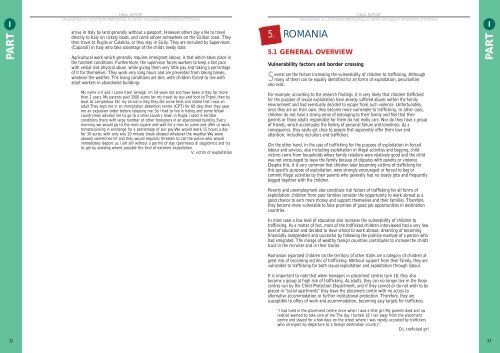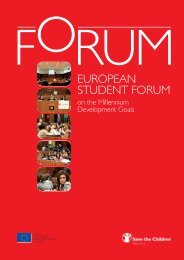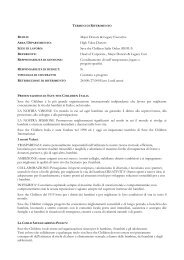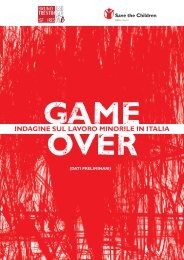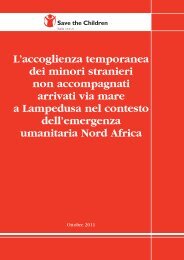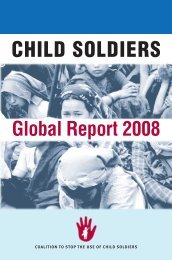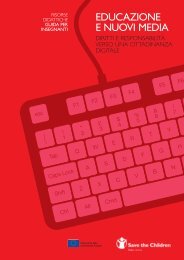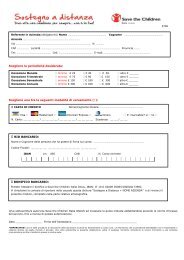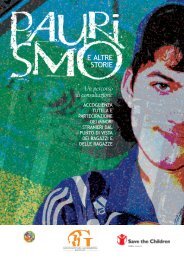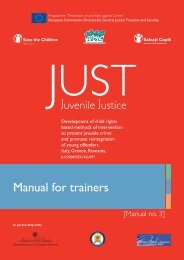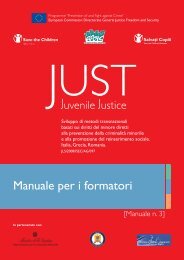IPART<strong>FINAL</strong> <strong>REPORT</strong>Development of a Child Rights Methodology to Identify and Support Child Victims of Traffickingarrive in Italy by land generally without a passport. However o<strong>the</strong>rs pay a fee to traveldirectly to Italy on rickety boats, and come ashore somewhere on <strong>the</strong> Sicilian coast. They<strong>the</strong>n travel to Puglia or Calabria, or <strong>the</strong>y stay in Sicily. They are recruited by Supervisors(Caporali) in Italy who take advantage of <strong>the</strong> child’s needy state.Agricultural work which generally requires immigrant labour, is that which takes place in<strong>the</strong> harshest conditions. Fur<strong>the</strong>rmore, <strong>the</strong> supervisor forces workers to keep a fast pacewith verbal and physical abuse, while giving <strong>the</strong>m very little pay and taking a percentageof it for <strong>the</strong>mselves. They work very long hours and are prevented from taking breaks,whatever <strong>the</strong> wea<strong>the</strong>r. The living conditions are dire, with children forced to live withadult workers in abandoned buildings.5. ROMANIA<strong>FINAL</strong> <strong>REPORT</strong>Development of a Child Rights Methodology to Identify and Support Child Victims of Trafficking5.1 GENERAL OVERVIEWVulnerability factors and border crossingSeveral are <strong>the</strong> factors increasing <strong>the</strong> vulnerability of children to trafficking. Althoughmany of <strong>the</strong>m can be equally identified for all forms of exploitation, peculiaritiesalso exist.IPARTMy name is V and I come from Senegal. I’m 19 years old and have been in Italy for morethan 2 years. My parents paid 3500 euros for my travel: by bus and foot to Tripoli, <strong>the</strong>n byboat to Lampedusa. On my arrival in Italy, <strong>the</strong>y did some tests and stated that I was anadult.They kept me in an immigration detention centre (CPT) for 60 days <strong>the</strong>n <strong>the</strong>y gaveme an expulsion order before releasing me. So I had to live in hiding, and some fellowcountrymen advised me to go to a small country town in Puglia. I lived in terribleconditions <strong>the</strong>re with large number of o<strong>the</strong>r foreigners in an abandoned building. Everymorning, we would go to <strong>the</strong> main square and wait for a man to come and offer us worktomato-picking in exchange for a percentage of our pay. We would work 15 hours a dayfor 30 euros, with only one 20 minute break allowed whatever <strong>the</strong> wea<strong>the</strong>r. We wereabused, sometimes hit and <strong>the</strong>y would regularly threaten to call <strong>the</strong> police who wouldimmediately deport us. I am still without a permit of stay (permesso di soggiorno) and tryto get by, avoiding where possible this kind of extreme exploitation.V., victim of exploitationFor example, according to <strong>the</strong> research findings, it is very likely that children traffickedfor <strong>the</strong> purpose of sexual exploitation have already suffered abuses within <strong>the</strong> familyenvironment and had eventually decided to escape from such violence. Unfortunately,once <strong>the</strong>y are on <strong>the</strong>ir own, <strong>the</strong>y become more vulnerable to trafficking. In o<strong>the</strong>r cases,children do not have a strong sense of belonging to <strong>the</strong>ir family and feel that <strong>the</strong>irparents or those adults responsible for <strong>the</strong>m do not really care. Nor do <strong>the</strong>y have a groupof friends, which accentuates <strong>the</strong> feeling of personal failure and loneliness. As aconsequence, <strong>the</strong>y easily get close to people that apparently offer <strong>the</strong>m love andattention, including recruiters and traffickers.On <strong>the</strong> o<strong>the</strong>r hand, in <strong>the</strong> case of trafficking for <strong>the</strong> purpose of exploitation in forcedlabour and services, also including exploitation in illegal activities and begging, childvictims come from households where family relations were relatively good and <strong>the</strong> childwas not encouraged to leave <strong>the</strong> family because of disputes with parents or violence.Despite this, it is very common that children later becoming victims of trafficking forthis specific purpose of exploitation, were strongly encouraged or forced to beg orcommit illegal activities by <strong>the</strong>ir parents who generally had no steady jobs and frequentlybegged toge<strong>the</strong>r with <strong>the</strong> children.Poverty and unemployment also constitute risk factors of trafficking for all forms ofexploitation: children from poor families consider <strong>the</strong> opportunity to work abroad as agood chance to earn more money and support <strong>the</strong>mselves and <strong>the</strong>ir families. Therefore,<strong>the</strong>y become more vulnerable to false promises of good job opportunities in destinationcountries.In most cases a low level of education also increases <strong>the</strong> vulnerability of children totrafficking. As a matter of fact, most of <strong>the</strong> trafficked children interviewed had a very lowlevel of education and decided to leave school to work abroad, dreaming of becomingfinancially independent and successful by following <strong>the</strong> positive example of a person whohad emigrated. The mirage of wealthy foreign countries contributes to increase <strong>the</strong> child’strust in <strong>the</strong> recruiter and in <strong>the</strong>ir stories.Romanian separated children on <strong>the</strong> territory of o<strong>the</strong>r states are a category of children atgreat risk of becoming victims of trafficking. Without support from <strong>the</strong>ir family, <strong>the</strong>y arevulnerable to trafficking for both sexual exploitation and exploitation through labour.It is important to note that when teenagers in placement centres turn 18, <strong>the</strong>y alsobecome a group at high risk of trafficking. As adults, <strong>the</strong>y can no longer live in <strong>the</strong> thosecentres run by <strong>the</strong> Child Protection Department, and if <strong>the</strong>y cannot or do not wish to beplaced in “social apartments” <strong>the</strong>y leave <strong>the</strong> placement centre with no access toalternative accommodation or fur<strong>the</strong>r institutional protection. Therefore, <strong>the</strong>y aresusceptible to offers of work and accommodation, becoming easy targets for traffickers.“I had lived in <strong>the</strong> placement centre since when I was a little girl. My parents died and norelative wanted to take care of me.The day I turned 18 I ran away from <strong>the</strong> placementcentre and stayed for a few days on <strong>the</strong> street where I was rapidly accosted by traffickerswho arranged my departure to a foreign destination country”.D.I., trafficked girl3233
IPART<strong>FINAL</strong> <strong>REPORT</strong>Development of a Child Rights Methodology to Identify and Support Child Victims of TraffickingIn Romania, <strong>the</strong> law (Law no 248/2005 on conditions applicable to Romanian citizenstravelling abroad) prohibits children from leaving <strong>the</strong> country without adultaccompaniment. At <strong>the</strong> border, children under 18 years old who hold individual passportsmust present (as <strong>the</strong>y leave <strong>the</strong> country) declarations from <strong>the</strong>ir parents or o<strong>the</strong>r legalrepresentative responsible for <strong>the</strong>ir upbringing, care or supervision, witnessed by a notary,permitting <strong>the</strong>m to leave <strong>the</strong> country. In <strong>the</strong> case of children travelling on one of <strong>the</strong>irparents’ passports, <strong>the</strong> accompanying parent must present <strong>the</strong> legal agreement of <strong>the</strong> o<strong>the</strong>rparent to <strong>the</strong> border police officers. If a child’s parents are divorced and <strong>the</strong> child wasentrusted by way of a court decision, to <strong>the</strong> parent accompanying <strong>the</strong>m abroad no suchagreement is required.<strong>FINAL</strong> <strong>REPORT</strong>Development of a Child Rights Methodology to Identify and Support Child Victims of Traffickingpromised higher earnings from practising prostitution abroad. Some of <strong>the</strong> traffickedchildren interviewed said <strong>the</strong>y were sold to traffickers by local pimps.Ano<strong>the</strong>r recruitment manner, used to a lesser extent in <strong>the</strong> case of children, is representedby <strong>the</strong> advertisements in <strong>the</strong> press for job offers abroad. These announcements address abroad age bracket, but especially girls over 16 years of age. These advertisements may alsocome from matrimonial agencies. Girls leave <strong>the</strong> country convinced that <strong>the</strong>ir futurehusband waiting for <strong>the</strong>m beyond <strong>the</strong> border (a person that <strong>the</strong>y believe <strong>the</strong>y have seenin a photograph or with whom <strong>the</strong>y have corresponded for a short period of time) willoffer <strong>the</strong>m a better life.IPARTIn most cases it seems that trafficked children exit <strong>the</strong> Romanian border legally. As amatter of fact, since 2002 Romanian citizens have not required a visa to travel within <strong>the</strong>Schengen area and since 2007, when Romania became member of <strong>the</strong> European Union,travelling to o<strong>the</strong>r EU Countries has become even easier. None<strong>the</strong>less, according to <strong>the</strong>research findings, when <strong>the</strong> victim is very young, <strong>the</strong> probability of illegally leaving <strong>the</strong>country is much higher, because to do that legally requires a great number of documents.When children cross borders legally, <strong>the</strong>y explain that <strong>the</strong>y are leaving <strong>the</strong> country ei<strong>the</strong>rfor tourism or for visiting relatives or friends. Even though <strong>the</strong> border is crossed legally,<strong>the</strong>re are cases in which false documents are used, especially in <strong>the</strong> case of children whocan (because of <strong>the</strong>ir physical appearance) pass as adults (18 years old and above). Manychildren trafficked to Western European countries (for example France, Italy or Spain)are accompanied by family members who are <strong>the</strong> traffickers <strong>the</strong>mselves.5.2 TRAFFICKING OF CHILDRENFOR SEXUAL EXPLOITATIONProfiles and methods of recruitmentThe majority of child victims of trafficking or at risk of becoming victims oftrafficking for <strong>the</strong> purpose of sexual exploitation are girls, aged between 15 and 17.Despite this, it seems that <strong>the</strong> request for children of a younger age is increasing (girlsaged between 12 and 14). They come from ei<strong>the</strong>r poor regions (e.g. Moldova, Muntenia,Dobrogea, Transilvania and Oltenia) or urban agglomerations (e.g. Constant ‚ a, Galat ‚ i,Buzău, Brăila, Iaşi).Most frequently, children trafficked for sexual exploitation are recruited by acquaintancesor friends and are promised jobs abroad (usually as a babysitter, waitress or housekeeper).Sometimes <strong>the</strong> parents <strong>the</strong>mselves or relatives are involved in <strong>the</strong> trafficking of children,giving <strong>the</strong>ir written permission to leave <strong>the</strong> country, even though <strong>the</strong>y know what willhappen. <strong>Children</strong> are approached by <strong>the</strong> recruiters in diverse locations, such as discos,<strong>the</strong> street, but also schools and <strong>the</strong> family home.“In a lot of cases <strong>the</strong> sale is facilitated by <strong>the</strong> children’s parents <strong>the</strong>mselves.They ei<strong>the</strong>rdon’t realise what is going to happen, or <strong>the</strong>y do it consciously.Sometimes, children that come from an institutionalised environment are also sold, and <strong>the</strong>sale is facilitated by <strong>the</strong> representatives of <strong>the</strong> institution”.Social Assistant,Transit Center Timisoara“I met a girl and we shortly became good friends.Toge<strong>the</strong>r with her I left for Italy, to get ajob as a babysitter, wanting to become financially independent. We were taken by car toItaly where we met an <strong>Italia</strong>n who gave us false documents to get to Ireland”.Elena C., 16 years old, trafficked childKidnappings represent a rarer method of recruitment than false promises of work, but<strong>the</strong>y are more violent and traumatic for <strong>the</strong> victims. In <strong>the</strong>se cases, <strong>the</strong> recruiter usesviolence right from <strong>the</strong> start. In <strong>the</strong> case of kidnappings, <strong>the</strong> possibility of crossing <strong>the</strong>border is very low, so <strong>the</strong> traffickers resort to “guides” which, for a cost, facilitate bordercrossingby avoiding check points.Transport and trafficking routesThe transportation means are usually <strong>the</strong> traffickers’ cars. O<strong>the</strong>rwise, taxis or publictransportation (train, buses, mini-buses of specialised travel companies or plane).When children legally leave <strong>the</strong> country, <strong>the</strong> border is usually crossed at Nădlag and Borş(in <strong>the</strong> West of <strong>the</strong> country) Stamora Moravit ‚ a and Arad Turnu (in <strong>the</strong> South-West) andtransit through Hungary.The same means of transportation are also used in <strong>the</strong> case of illegal border crossing.<strong>Children</strong> are brought to <strong>the</strong> border and from <strong>the</strong>re, <strong>the</strong>y are taken over by ano<strong>the</strong>rperson (<strong>the</strong> guide) who knows how to avoid <strong>the</strong> check points of <strong>the</strong> border Police. Thosewho illegally cross <strong>the</strong> border are usually foreign adults, or adult Romanian citizensaccompanying children who may be prohibited from leaving <strong>the</strong> country due to a pastcriminal record. In this case, a fur<strong>the</strong>r method used to circumvent <strong>the</strong> restriction onleaving <strong>the</strong> country is that those Romanian citizens marry women with a “clean” past andtake that woman’s name. This woman may be as young as 16 or 17 years old, and mayalso become a victim of trafficking at <strong>the</strong> hands of <strong>the</strong>ir husband.In some cases, children are hidden inside <strong>the</strong> means of transportation.“A boy from my village whose family I knew, came to my family and proposed that I go toItaly to work decently. I asked him how we would get <strong>the</strong>re and he told me that <strong>the</strong>re wasno problem because he would arrange everything (my passport and my transportation).From Timisoara I travelled by bus, and at <strong>the</strong> border he told me to hide in a place, speciallyarranged, near <strong>the</strong> bus stairs. After we had crossed <strong>the</strong> border, I made acquaintance withmy pimp to whom I was sold.”Trafficked childIn <strong>the</strong> case of children recruited in Romania by networks of traffickers, <strong>the</strong> routes arepre-established. Depending on <strong>the</strong> network structure, trafficked children are taken overby different persons in different points of <strong>the</strong> route until <strong>the</strong> moment when <strong>the</strong>y get to<strong>the</strong> person that will host and exploit him/her. There are cases in which <strong>the</strong> recruiter isnot a member of a trafficking network, but finds a contact person in ano<strong>the</strong>r countryand enters for <strong>the</strong> first time in such a network. This is usually <strong>the</strong> case of children sold by<strong>the</strong>ir parents or relatives.34Most of <strong>the</strong> time recruiters organise <strong>the</strong> departure in a very short timeframe (2-3 days)after approaching <strong>the</strong> victims, so as not to allow <strong>the</strong>m to think too much about <strong>the</strong> offeror to talk to o<strong>the</strong>r persons who might stop <strong>the</strong>m.In some cases, trafficked children are already involved in prostitution and are offered jobsabroad implying “innocent” sexual activities in private clubs or massage parlours, or areLiving conditions and forms of exploitationAs already emerges from <strong>the</strong> paragraph presenting risk factors, prior to beingtrafficked, <strong>the</strong> children’s living conditions include a low socio-economic standardand poor housing conditions, where family conflicts and child abuse are frequent.35


